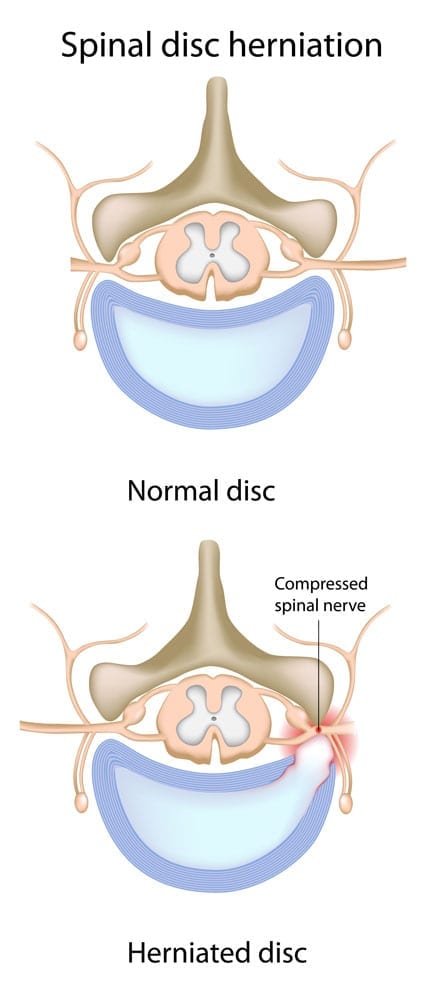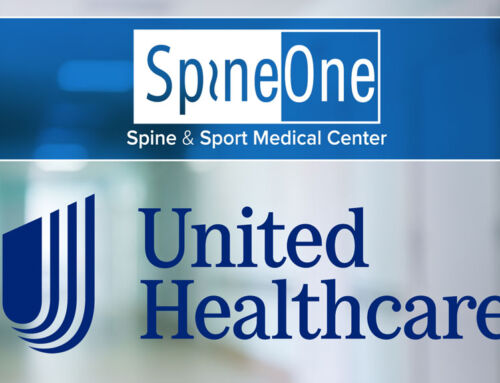SpineOne has been treating back pain and spinal disorders in Denver for twenty years. While the technology, techniques, and treatments we use have evolved over that time, the common conditions and injuries we treat have remained mostly the same. One of the most common spinal disorders we treat is a herniated disc. This condition is also referred to as a “ruptured disc” or “bulging disk,” but whatever name it goes by, it is one of the most common sources of back pain when it occurs. It can happen from natural aging, acute injury, congenital conditions, or spinal degeneration. The pain from a herniated disc can range from a minor irritant to a life-disrupting agony.
Herniated discs have a wide range of causes, a substantial range of pain, and many options for treatment. So how do you know when it’s time to see a doctor to prevent serious, potentially permanent complications?
The most important thing to remember is that herniated symptoms can be indicative of potentially serious complications that warrant urgent medical attention. If you experience any of the severe herniated disc symptoms below, contact your doctor immediately:
- Loss of bowel and/or bladder control, loss of feeling in your lower extremities (legs and feet):These symptoms may be related to cauda equina syndrome, a rare but serious spinal disorder requiring immediate medical attention.
- Loss of balance and fine motor skills and muscle weakness: These symptoms signal spinal nerve compression. In the most severe cases, the herniated disc can compress the spinal cord itself—this is known as myelopathy.
Same Day Appointments Available
WHY to see a Doctor for Herniated Disc Symptoms
A disc that herniates and compresses or pinches a nerve in your spine can cause numbness, weakness, tingling, shooting pain, bowel and/or bladder problems—symptoms that can take a huge toll on your quality of life.
If conservative treatments, stretching, and therapy provide little relief, or if the pain interferes with your daily life, it might be time to see a doctor. Nerve compression, when treated early, has a high likelihood of complete recovery. If your inclination is to tough it out, you should remember that if you wait too long to address your nerve-related pain, you risk having long-term or permanent nerve damage.
A 2011 study suggested that waiting too long to seek medical treatment for a herniated disc may end up doing more harm than good. The study compared two groups of patients who had lumbar herniated discs. Patients who waited longer than six months to report their herniated disc symptoms to a doctor did not respond as well to treatment as those who waited less than six months to seek medical advice.
The lesson here is not to wait too long to visit your doctor if your herniated disc pain is severe. Seeing a doctor sooner rather than later may improve the success of your treatment, and waiting too long may result in long-term nerve damage that is unlikely to respond to treatment at all.
WHEN to see a Doctor for Herniated Disc Symptoms
Same Day Appointments Available
If your herniated disc pain isn’t responding to medication and rest, it’s probably time to seek the advice of a specialist. But which spine specialist to choose? Seeing your doctor about your herniated disc symptoms will likely include getting an imaging scan (e.g., a CT or MRI scan) to show exactly what’s causing your pain. Knowing the true cause is essential to helping your doctor develop a treatment plan that appropriately addresses these symptoms.
Your family doctor may refer you to a particular specialist, but traditional options usually involve long waits for appointments, plus the added time for referrals for imaging, diagnosis, and treatment. But if your herniated disc pain has progressed far enough for you to see a doctor, you can’t wait that long. A Spine Specialist like SpineOne can help prevent serious herniated disc pain and complications and can do so quickly and effectively.
Our medical center is designed to determine the cause and severity of your herniated disc and craft a treatment plan that minimizes your pain and long-term complications. These services are all provided under one roof, with a clinic, modern CT & MRI scanners, and a treatment center on-site. We can often diagnose herniated disc pain the same day you come in. And in severe cases can also offer same-day treatments to give you relief and let you get back to your busy life.



